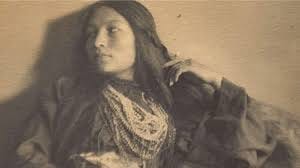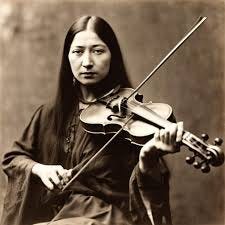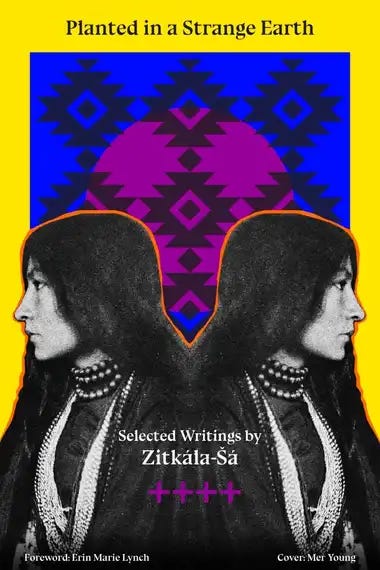Finding Lost Voices: The Important Voice of Zitkála-Šá (also known as Gertrude Simmons Bonnin, 1876-1938)
A weekly email that brings back the voices of those who have been forgotten or misremembered.
I’ve been on the road, promoting my new biography, Riding Like the Wind: The Life of Sanora Babb. Most recently I was at the wonderful Prairie Lights bookstore in Iowa City where Professor Harry Stecopoulos asked me an interesting question in the Q and A. He said he hadn’t really heard much about the recovery of women’s voices since the Second Wave of Feminism back in the 1970s and 1980s and he asked if I was trying to reinvigorate that movement with my work. I was struck by his question for a number of reasons. First, in the world where I live, the work I am doing is not isolated. I see myself as one of the many people and organizations that are working toward bringing back the voices of women who have been forgotten. Second, I realized that my world is small and the work to bring back women’s voices who have been forgotten is large. His comment reinvigorated me. It made me want to ask you, my dear readers, who are also part of this community, to continue to share out these stories. There is still so much work to be done. When I started writing these posts, almost eleven months ago, people kept asking me, how will you ever find enough content to fill a weekly post? I mean, are there really that many lost voices? Sadly, the answer is a resounding yes. For every post I post each week, there are ten other stories about a lost voices I wasn’t able to write about.
Are you interested in reading Sanora Babb’s classic Dust Bowl novel, Whose Names Are Unknown? If you become a paid subscriber right now, you start receiving weekly reading guides for this amazing novel.
This week, when America is pulsing with tension on the brink of what feels like one of the most important elections in our history, it feels especially important to highlight the work of an activist who fought the oppression she faced her entire life and changed voting rights. Zitkála-Šá (also known as Gertrude Simmons Bonnin) (1876 - 1938) was a Ihanktuƞwaƞ Dakota woman was a gifted musician, a passionate writer and fierce activist who fought for women's suffrage and Indigenous voting rights in the early 20th century.
In 1876, Zitkála-Šá was born on the Yankton Indian Reservation in South Dakota . She was a member of the Yankton Sioux (or Dakota) Nation. Her mother, “Reaches for the Wind” or Ellen Simmons, was of Sioux Dakota heritage and her father was of French descent. After her father abandoned their family, Zitkála-Šá was raised by her mother and aunts. Just six months after her birth, June 25-26, the Lakota, Cheyenne and Arapaho peoples fought and defeated the U.S. Army on the ridges, steep bluffs, and ravines of the Little Bighorn River at the Battle of the Little Big Horn. This defeat did little to help the plight of Indigenous people in the United States. Treaties that were made with indigenous nations were breached and negated. And it was in the shadow of this conflict that Zitkála-Šá grew up. However, instead of hiding in that shadow, or being hidden in it, Zitkála-Šá with her passion and voice, fought her way to the light.
When Zitkála-Šá was eight years old, a group of white missionaries visited her reservation. The bright and curious young girl was convinced by the missionaries to attend their Quaker-run boarding school in Wabash, Indiana. Her mother did not want to send her, but young Zitkála-Šá who was already a convincing orator when she wanted something, was able to convince her mother to change her mind. It was a decision both she and her mother would regret.
To say that Zitkála-Šá’s time at the school was traumatic would be an understatement. The boarding school she attended was part of a larger attempt to assimilate Indigenous people by erasing their Native traditions and culture. While attending the school, Zitkála-Šá was beaten and punished for speaking her tribal language or practicing her Sioux culture.
After graduation, Zitkála-Šá attended Earlham College, where she was one of the few Indigenous students. When she was a freshman she entered the Indiana State Oratorical Contest with a speech she’d written herself. A speech that was originally focused on women’s rights, but that she had altered to encompass a topic she was growing more and more passionate about: Indigeous rights. Zitkála-Šá was the only indigenous person at the competition, but that did not deter her from what she talked about when she took to the stage. In the same convincing style she’d used to change her mother’s mind about allowing her to receive an education, Zitkála-Šá passionately pleaded for equal rights for the American Indian, in “the name of religion and liberty.” She outlined the reality she had lived, that throughout the brutal history of the United States the “civilized” white man “had failed to keep his promises” to Indigenous nations. As she stated, “Our country must not shame her principles by such consummate iniquity.”
Zitkála-Šá transferred to The New England Conservatory of Music to study violin. It’s while she was studying music in Boston, that Zitkála-Šá began to write autobiographical essays and short stories about her life. Then, in 1900, Zitkála-Šá accepted a position teaching music and speech at the Carlisle Indian Industrial School in Carlisle, Pennsylvania. Founded by Richard Henry Pratt, the notorious institution was run under his philosophy to “Kill the Indian, Save the Man.” Zitkála-Šá could only tolerate working at the institution for two years before she had to quit. The place haunted her. All of the trauma she had from the boarding school she had attended came rushing back and she believed the school’s administration patronized Native students by offering a limited vocational instruction instead of more academic subjects.
Zitkála-Šá returned to the reservation where she grew up and began to work for the Bureau of Indian Affairs (BIA) at Standing Rock Indian Reservation as a clerk. It’s here that she started to focus her passion and activism into writing. In 1902, she published “Why I am a Pagan,” in Atlantic Monthly, an essay about her own traditional beliefs to counter the trend of conversation and assimilation of Indigenous people to Christianity.
In 1902 she married Captain Raymond Talephause Bonnin, who was also of Yankton Sioux ancestry. And the two moved to Utah when Bonin was assigned to be superintendent of the Uintah and Ouray Reservation Agency. They spent fourteen years on the reservation, during which Zitkála-Šá witnessed the discrimination of Uintah and Ouray peoples by white employees of the Reservation Agency Uintah. Observations that added further evidence to her belief that the reservation system was corrupt, leaving Native Americans without the power to make their own choices.
In 1911, Zitkála-Šá joined the Society of American Indians (SAI), an organization founded for and by Native Americans to challenge the wardship status of Native Americans and their lack of U.S. citizenship. In 1917, she moved to Washington DC where she also became activist for the Women’s Suffrage Movement. She used her commanding voice and speaking skills at the National Women’s Party headquarters in 1918 to advocate for the rights of women. But she also used her voice to educated the public about the injustices continually enacted against Indigenous peoples and nations in the United States.
In 1926 she formed the National Council of American Indians with her husband and they traveled around the country hearing concerns, discussing policy and registering voters. Some states tried to disenfranchise Native people with laws influenced by Jim Crow laws. But Zitkála-Šá fought for Native rights, suffrage, and self-governance fought against all of the discrimination until the day she died January 26, 1938. She is buried at Arlington National Cemetery.
Zitkála-Šá’s writings, such as American Indian Stories (1921) and Oklahoma’s Poor Rich Indians (1927), focused on Dakota history and culture, corruption of the United States government at the expense of Native people, and the trauma and terror experienced by Indigenous children who were separated from their families and culture in these boarding schools.
Lucky for us, thanks to the work of Cita Press, you can now read Zitkála-Šá’s collected fiction, nonfiction and poetry in the recently published free volume: Planted in a Strange Earth: Selected Writings by Zitkála-Šá .
Thank you, readers, for continuing to support this work. There is still so much work to be done.
Upcoming Events for Riding Like the Wind: The Life of Sanora Babb
November
November 1 - 6:00 PM- 7:30 PM - Catamaran Lit Chat with Iris Jamahl Dunkle - Catamaran Literary Reader - 1050 River St., Studio 118 Santa Cruz, CA 95060
November 7, 7:00 PM - “You Can’t Eat the Scenery,” The Life of Sanora Babb with Iris Dunkle, 101 Archer, Oklahoma Center for the Humanities, Tulsa, OK
November 13 - 6:00 - 7:00 PM - Riding Like the Wind: The Life of Sanora Babb - Book Club at Pasadena Heritage, Pasadena Heritage, 160 N. Oakland Avenue, Pasadena, CA 91101
November 18 - Riding Like the Wind: The Life of Sanora Babb - The Book Club of California | 47 Kearny Street | Suite 400 | San Francisco, CA 94108 (Attend in-person) (Attend online)
November 19, 4:30 PM Iris Jamahl Dunkle in conversation with Matthew Stratton UC Davis Manetti Shrem Museum - 254 Old Davis Road, Davis, CA 95616
November 20, 5:00 PM Book Talk with Author Iris Jamahl Dunkle on “Riding Like the Wind: The Life of Sanora Babb” UC Berkeley, English Department (Wheeler Hall, Room 300)
November 21, 7:00 PM Iris Jamahl Dunkle and Forrest Gander in Conversation - Clio’s Books, 353 Grand Ave, Oakland, CA 94610
December
December 1, 2:00 PM - Iris Jamahl Dunkle in Conversation with Kristen Hanlon at the Alameda Library, Alameda, CA
December 11, 6:30 PM - Iris Jamahl Dunkle in Conversation with Lisa Moore, Book Woman, Austin, TX
January 2025
January 24 - Case Western Reserve University, Cleveland, OH
January 25 - Reading with Jan Beatty at White Whale Books in Pittsburgh, PA
January 27 - Iris Jamahl Dunkle in Conversation with Donovan Hohn at Literati in Ann Arbor, MI
January 28 - Iris Jamahl Dunkle at Morgenstern Books, Bloomington, Indiana
February
February 21, Iris Jamahl Dunkle’s talk at New York University, New York, NY
February 26, 6:00 PM Iris Jamahl Dunkle reads at King's English, Salt Lake City, UT
February 27 - Iris Jamahl Dunkle reads at American West Center, Salt Lake City, UT
March
March 5 - The Bill Lane Center for the American West: Stanford, CA
March 13- 5:00 PM Garden City Community College, Kansas
March 14 - Books and Books in Key West, FL
March 21 - 2:00 PM New York Public Library, New York City
May
May 17 - 5:30 - 7:30 PM - National Steinbeck Center, Salinas, CA







